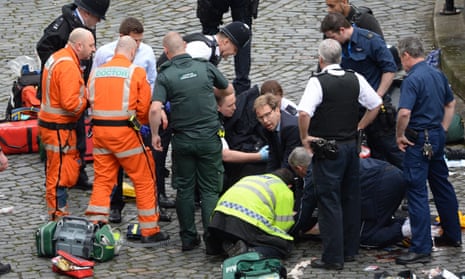There are certain places that cease to be places in the public imagination. They become shorthand for a loathed political establishment or distant, overmighty government. In America, that place is “Washington, DC”. For Eurosceptics, it’s “Brussels”. And in Britain, that reviled, imperial citadel is “Westminster”.
Yet today, as the airwaves and social media timelines filled with dreadful, violent news, “Westminster” began to lose those quotation marks. As the afternoon passed, it became seen not as the widely despised bastion of the political class, but a real place inhabited by office workers, tourists, security guards and groups of visiting schoolchildren.
On any other day, Tobias Ellwood might be seen as just another Tory MP. But then came word that he had given CPR and mouth-to-mouth resuscitation to a policeman who lay wounded – and with it a reminder that the MP, a former army officer, had lost a brother in the Bali bombings of 2002.
Or there were those photos of MPs locked in the chamber of the Commons for their own safety, many of them on their phones, searching for news just like the rest of us but with an extra edge: they were worrying about friends, colleagues or their own employees. Everyone had the same thought: what if someone they knew or loved was among those hurt?
As it happens, I was in Westminster (though not in parliament) when the attacker struck, wrapping up a lunch meeting with an MP who was alerted to the news by a text from his wife, checking that he was safe. On television, he’ll look like just another politician. But if people saw him today, they’d have seen a human being.
And yet, when it comes to those involved in politics – the people who keep our democratic machinery functioning – it seems to take violent tragedy to remind us that those we elect to represent us don’t stop being people the moment we vote for them. Last year it was the murder of Jo Cox that reminded people an MP could also be a living, breathing, loving person. At that moment, many felt chastened about the way we speak about politics – so often using violent language to describe political argument. We held back for a while. But we soon fell back into the old habits.
Yet if those who denounce Westminster had only seen it today. The speed with which the police and the emergency services ran towards danger when every human instinct would propel most of us away from it. The help ordinary people gave other ordinary people when they saw them lying hurt on Westminster Bridge. The security officers who brought a tray of tea to the police officers standing guard, watching over them. The visitors herded to safety, including a mother pushing a baby in a buggy. And the group of schoolchildren who reportedly decided to cheer up all those in lockdown in parliament’s Central Lobby with a spontaneous singsong.
Last year, on this very day, Brussels was targeted by suicide bombers who killed 32 people. For a few days, it stopped being the despised “Brussels” of anti-EU rhetoric and became Brussels, scene of tragedy. More than 20 years ago I witnessed the same transformation, when a US government building in Oklahoma City was bombed, killing 168. “Federal bureaucrats” had been a hated class – until people saw them carrying their wounded and grieving for their children. Today it was “Westminster’s” turn. Not a metaphor, not a far-off citadel of wicked, scheming politicians but a real place, filled with real people – as vulnerable to an act of murderous violence as anybody else.

